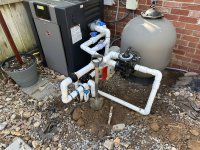Hello all! Long time lurker - we bought a house with a pool in 2019 - pool was built in the early 90s, not sure by whom or to what standard. In any case, the pump gave out and I had to have a new one installed this month. The pool installer noted that he couldn’t find the bonding wire near the equipment pad - after research and digging down around the pad, I found a narrow pvc pipe sticking up near the equipment (see picture). There’s no visible wire in the part I can see prior to a 90 degree elbow bend - is it possible the wire is in this pipe and/or that it has slipped down into the tube proper? 
If that isn’t the bond, any idea where it might be?
If there isn’t one, any suggestions on how to make my equipment more safe (aside from the painful “bust up concrete around pool and bond”)?
Thanks all!
Gazebo

If that isn’t the bond, any idea where it might be?
If there isn’t one, any suggestions on how to make my equipment more safe (aside from the painful “bust up concrete around pool and bond”)?
Thanks all!
Gazebo

